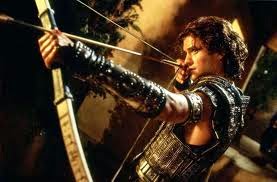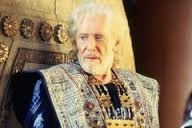BRAD PITT – PETER O’TOOLE – TROY – 2004
The Iliad and Achilles have
always been fascinating mirrors to the western mind. This rather short version
of the Trojan War is done for a popular audience and it shows. It is also done
for a modern audience and it has to be short. It sure is shortened.

We could list all the essential events
that are missing from the human sacrifice of Agamemnon’s daughter by Agamemnon
himself to get from the “Gods” a favorable wind to go to war. And the “Gods”
did not substitute a goat or a ram to Iphigenia as another “God” will do when
Abraham was going to sacrifice his own son, though we will never know if it was
Isaac or Ishmael, since there are two versions running around, one behind the
other, both trying to catch their own tails in their own teeth. Human sacrifice
is part of humanity, has been and will be as long as wars and the death penalty
exist. The Celts burned the guilty alive in baskets hanging from trees. The
Romans dipped people in boiling oil or crucified them along the roads. The
medieval church burned witches and wizards at the stake, or fried homosexuals
in a frying pan with oil in France,
or grilled homosexuals on a grill without any oil at all in England. And
what about these marvelous death penalties that do not work or take a long time
to be effective in our modern civilized countries? We regret a great show like
in England under kings and queens up to Elizabeth I when a convicted criminal
would be drawn by horses to the Bartholomew Fair ground on the day before the
Bartholomew Fair to be hanged there but not to death, brought down, drawn in
the meaning of eviscerated, quartered and finally beheaded, the head being
picked by the hair and directed at the joyful gleeful crowd because the brain
and the eyes can see up to seven seconds after the beheading, so that the
guilty victim can see the people rejoicing at his or her death.

This film is very clean indeed.
The film is also totally silent
on the enormous stake of this war. They reduce it to power for Agamemnon. That’s
short. Troy controlled the main Indo-European
route from Iran to Europe
through Anatolia. That was one of the two
immigrating routes that produced our modern Europe.
Along this route came all kinds of goods but also knowledge like cattle raising
and agriculture and metal industry (or what it was at that very beginning of
the metal civilization) and religion. The Greeks wanted to take the control of
this commercial and cultural circulation to Europe
to make a profit on it. That is not power, that is commercial dictatorship.

The film is totally silent on the
fact that the beautiful Greek religion was in the process at the time the Iliad
was being written of integrating some religious and cultural elements of the people
who had been in Europe since 50,000 years ago and who represent 75-80% of modern
European DNA, viz. the Turkic population known as Cro-Magnon or the
Gravettians, and some others still known today as the Basques. By reducing the
historical stake of the Iliad and Ancient Greece, we can forget about the fact
that the Indo-Europeans conquered the whole of Europe with what will never be
more than a 20% minority in Europe.
What saves the film then?
In fact only two actors: Brad
Pitt as Achilles and Peter O’Toole as Priam. The others are secondary and most
of them mediocre. Brad Pitt gives some taste to the story, though of course the
particular relation between him and his cousin Patroclus is entirely unrevealed
and he even appears as a gallant person who saves a virgin teenage woman from
the grubby and dirty hands of soldiers. On the other hand Peter O’Toole gives Priam
the dignity and the force this old king must have had to have to be able to go
and beg for the body of his own son killed in fair fight by Achilles.
The famous Trojan horse is also a
nice character and the trick is surprising in the fact that it worked, at least
so does the legend have it.
Finally we could say the film
insists a little bit too much on couples of brothers. The two Greek Brothers,
Agamemnon and Menelaus on the Greek side and the two Trojan brothers Hector and
Paris on the Trojan side. And all that for a woman, Helen, who was married to
an old man, Menelaus, and fell for a more or less young teenager, Paris. But do
not expect any love in all that. It is only a question of possession for
Menelaus and intercourse for Paris.
Helen just has to play the game of satisfying the impulses of the man who
possesses her. The film even manages the escape of Andromache, Astyanax, Helen
and Paris, more or less and at least. Since Paris has managed to kill Achilles, he is not
even a hero and the fugitives are nothing but assassins. In other words the
film is doomed to have no morality.

Some beautiful battles and some
very impressive ramparts, city walls, palaces and temples, but not much more,
and the back side of Brad Piptt a couple of times for the perverse
cheese-addicts.
Dr Jacques COULARDEAU
Amazon.com
2 of 7
people found the following review helpful
There
is no war that can be redeemed,
May 29,
2004
By
There is no war that can be redeemed
This film is a beautiful show
though it will not in anyway change the face of the world. It shows that war is
a horrible adventure in which motivations are absolutely perverse, perverted
and hypocritical. One goes to war for a woman who was stolen from him. Women
are nothing but homestead possessions. One goes to war to increase his power by
conquering people who resist him.
War is a power game that is won
or lost after many deaths of soldiers and civilians who are not supposed to
question any point but only to obey. War is blind obedience for the soldiers
and blind submission for the civilians. One goes to war for the pleasure of
fighting to show his prowess, his courage, his « invincibility » and yet he
will be killed in the heart of victory because no one is invincible, no war is
a clean parade on an empty boulevard.
Then supplementary motivations
appear during the fighting or the discussions and rivalries among chiefs. It is
such events, like the killing of a cousin, the manhandling of a prisoner, or
any dramatic event, that can change the course of a war and bring into the
battle people who wanted to remain neutral. War is a big pot in which spiders
and predators are cooking, some enemies, some allies.
Finally most soldiers are going
into the war with only one objective: looting and taking advantage of the
situation to satisfy their basic and repulsive instincts to hurt, torture, maim
and enjoy the barbarity of such acts. Finally a war is always lost in the long
run and the victors are vanquished as Handel would say in Alexander's Feast. A
few of the princes of Troy will escape and they
will create Rome who will eventually conquer Greece
and submit them to their power.
History is always a vengeful game
if the will, interests and peace of the people are not taken into account.
Finally a war can only be won through a genocide : kill all your enemies and
you will carry the day. This film is the exposure of war as a crime against
humanity. Yet there are in this film a few, very few, but a few nevertheless,
scenes that redeem such horror.
The « invincible » Achilles is
vanquished by a sudden and unexplainable love that leads him into a mistake and
a trap, and there is no escape, no pardon, no tolerance, no considering the
honorable actions of before. He is an enemy, so he has to be killed. Everyone
will like the Trojan horse immensely that shows a war is always won through
perfidy, ruse, deception and the exploitation of the gullibility of the
opponents.
Nothing has changed except that
we are more conscious and sensitive to crime and perverse actions, and that we
have media who will expose any trespassing from some guideline. War is based on
lies but the media have the responsibility to expose such lies and when they
are exposed the war is lost for the liars who are exposed as such at the same
time. Yet the film is short on the real stakes of this war : the control of
eastern commercial routes and the danger such a strategic position represents
for those who are thus controlled by this commercial power.
Dr Jacques COULARDEAU
# posted by Dr. Jacques COULARDEAU @ 7:22 AM

